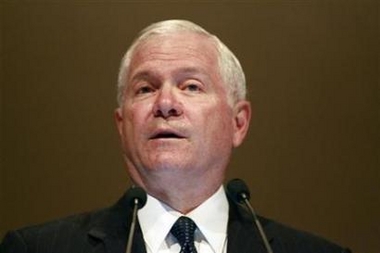US to discuss Afghanistan, missile defense at NATO
(Reuters)Updated: 2007-06-14 08:39
BRUSSELS - Defense Secretary Robert Gates will press NATO nations on Thursday to provide military and police trainers for Afghanistan and also plans to express interest in Russia's offer to cooperate on missile defense.
 Secretary of Defense Robert Gates speaks in Singapore June 2, 2007. [Reuters]  |
NATO regards its 36,000-strong security force in Afghanistan as its most critical mission and the United States has repeatedly called on other nations to contribute more troops and equipment to help defeat Taliban insurgents.
The current focus of US requests is reconstruction experts and embedded teams of military and police trainers to work alongside Afghans so that the 26-member alliance can one day hand over all security duties to local forces.
"I think countries are taking this seriously," Gates told reporters at Ramstein US air base in Germany before flying on to Belgium. "I will continue to press in Brussels."
Ministers are also expected to review procedures in Afghanistan in an effort to halt a wave of civilian casualties threatening to undermine public support for the alliance.
NATO commanders say some civilian deaths are the result of poor coordination with Afghan forces and a separate, US-led coalition. They say they recognize procedures must be tightened, accidents investigated more quickly and humanitarian help offered to victims.
Missile defence
The NATO meeting includes talks with Russian representatives in the NATO-Russia Council and Gates also plans to hold separate talks with Serdyukov.
A US defense official said those discussions would probably now take place on Friday rather than Thursday, as originally envisaged, due to a scheduling conflict.
For months Russia voiced strong criticism of Washington's plans for a missile defense shield which would involve a radar station in the Czech Republic and the stationing of interceptor missiles based in Poland.
Russia presented the scheme as a threat to its own security and said the proposed US bases on its doorstep could be converted to more dangerous uses in the future. Russian talk of aiming missiles at Europe sparked alarm on the continent.
The United States, for its part, has insisted the scheme is not aimed at Russia and intended primarily to intercept long-range missiles Iran may develop in future.
At last week's Group of Eight summit in Germany, Russian President Vladimir Putin made a surprise offer to cooperate with the United States on missile defense by sharing a Russian-controlled radar in Azerbaijan.
While some analysts have questioned how technically viable the proposal is, the United States is portraying the offer as a sign the Russians have accepted many of its arguments.
"I will certainly underscore our interest in exploring with them President Putin's proposal with respect to the radar in Azerbaijan," Gates said.
"I'm very pleased that President Putin acknowledged that there is merit to missile defense, that Iran does represent a problem that needs to be dealt with in terms of potential missile defense," he said.
"I think there's a basis for some good conversations."
|
||
|
||
|
|